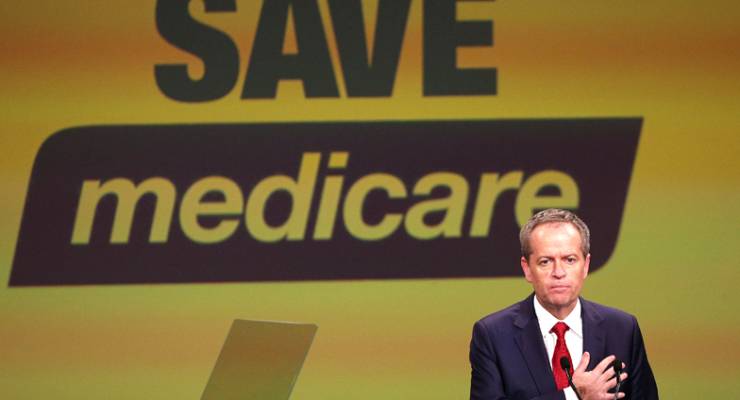
Labor’s Medicare campaign played a key role in driving people to vote for the party at the election, while the vaunted CFA dispute issue had virtually negligible effect, data from Essential Research shows.
Essential asked respondents to self-nominate reasons for their vote, in contrast to usual polling questions that provide a range of responses to select from. The results confirm some and contradict other interpretations for the extremely close outcome.
For example, the CFA dispute, in which the government and News Corp newspapers invested considerable resources to hype as an example of out-of-control unions, has been held as a reason for Labor failing to pick up seats in Victoria. However, it barely registers as an issue in the responses: less than 1% of Coalition voters nominated it as a reason for their vote, confirming on-the-ground reports from Labor that it had little effect and mostly confirmed existing anti-union views of rusted-on Liberal voters. In contrast, the post-Brexit emphasis from the Coalition on “stability” (summarised in the slogan “stick to the plan”) at least had some success: 4% of Coalition voters nominated “stability” as a reason.
[Essential: voters like Shorten more after all]
In contrast, 10% of Labor voters nominated Medicare as a reason for their vote, confirming the success Labor had with that campaign. The most common reason for voting Labor was some variation of “looks after average person/ low incomes, care about people”, nominated by 14%.
Eleven per cent and 12%, respectively, of Labor and Coalition voters said they always vote for their parties; 15% of Coalition voters said the Liberal and National parties were “better than other parties” or that they simply “liked them”, compared to 8% of Labor voters and 4% of Greens voters. The most popular reason for voting for the Coalition was “economic management” (18%) while “don’t like/trust Labor” was nominated by 6%. For Greens voters, the top reason (19%) was “don’t like/trust either Labor or Liberals”; 10% also nominated “don’t like/trust Liberals”, which was nominated by 12% of Labor voters.
Eight per cent of Greens voters nominated climate change or the environment as the reason for their vote. And while 9% of Coalition voters nominated “better policies”, without specifying them, 11% of Labor voters also did so and 10% of Greens voters did too; 8% of Labor voters nominated specific policies they preferred compared to 1% of Liberal voters and 4% of Labor voters; 5% of Coalition voters thought the Coalition was better for the country compared to 1% of Labor and Greens voters who voted for that reason.
As for “other” voters, the overwhelming reason was distrust of the major parties: 37% nominated “don’t like/trust either Labor or Liberals”.








Funny how the “CFA Scandal” has gone from almost daily Herald Sun front page coverage to practically disappearing the moment the election was over. You could almost think it was all about pushing an agenda…
One for the psephologists: How significant were Labor’s negative gearing and capital gains policies in electorates such as Chisholm. Anyone have data?
Only 8% of Greens voters cited climate change! That may increase as the rate of climatic disasters increase the rate that shocks tumble out of the television set onto the lounge room floor.
However the identifiers may change: “totally unexpected sea level surge”, “totally unexpected spread of malaria”, “totally unexpected typhoon in (blah)”, “totally unexpected floods in (blah)”, etc. As the seemingly fresh new threats appear, opportunities will arise for fresh new leaders to promise salvation. Let’s hope they stand for office instead of leading young heroes into the adventures of chaos.
The question is why did Labor not regain Deakin and Corangamite, and could not hold on to Chisholm. Whilst this is not shades of 1969, when apart from Corio picked up in a by-election, not a single seat was gained- leading to intervention against a Labor organisation that was the gift that kept on giving to the coalition.
In Deakin the Liberal candidate had something in my letterbox almost daily, with a little help from the Australian Christians. He even had corflutes in the grounds of the local mosque. The tenors of his campaign were the abandoned East-West link, Labor deficits and the CFA. I hardly had any campaign material from Labor. The Liberal was prominent around sporting clubs in the area offering at least $12m towards improvements to clubrooms and an indoor netball centre. It seems that there wasn’t a budget crisis after all.
Apparently, there was a Liberal campaign circulated on WeChat, (the Chinese Facebook), in the Chisholm electorate which has a high percentage (about 20%) of Chinese residents. As WeChat is in Chinese language it probably received very little attention compared to if it was in English. Claims were made that voting Labor would lead to vast increases in refugee numbers which would mean fewer family visas, or suggesting that the Safe Schools program would mean boys could use girls’ toilets. On WeChat, a Glen Eira councillor, Kelvin Ho, even suggested that legalising same-sex marriage would lead to approval of bestiality.
https://www.theguardian.com/australia-news/2016/jul/09/how-a-chinese-language-social-media-campaign-hurt-labors-election-chances
Angela, I read that article too.
And the Libs have the front to suggest that Labor’s Medicare campaign was a ‘lie’!!
Go figure!
Check the Limited News Party vernacular – from long observation I think you’ll find “Lie : something only used by other parties”?
When it comes to the Limited News set “(as) I believe/understand it” can be used to cover anything – something like how an enema works?